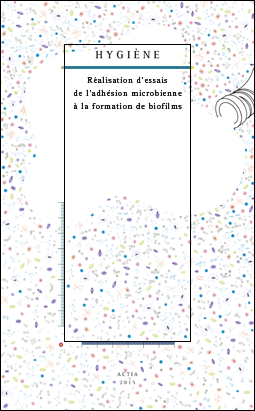CONDUCTING TRIALS FOR STUDYING MICROBIAL ADHESION AND BIOFILM FORMATION
2015

Text in French
In the food industry, the bio-contamination of surfaces can be a significant cause of lost profits due to the soiling of equipment (increased energy consumption, reduced productivity, degradation of the finished product, etc.).
When it involves pathogenic germs, this bio-contamination can sometimes be the source of severe public health problems.
Conscious of the socio-economic and scientific challenges that such bio-adhesive phenomena can generate, the ACTIA CHLEAN joint technological network has set itself several missions, including improving the understanding of bio-adhesive phenomena to offer food industry manufacturers innovative solutions for controlling products’ health risks and the hygiene of equipment.
In this context, it appeared necessary to provide harmonised methods for studying microbial adhesion, the first stage of the formation of biofilms, through this guide.
These methods and the related recommendations are aimed at any laboratory that wants to carry out work on contaminated surfaces (adhered cells or biofilm) in order to, for example:
- evaluate the effectiveness of cleaning agents and disinfectants;
- study bio-transfers from surfaces to foodstuffs;
- determine the adhesion capacity of various microorganisms;
- optimise detachment techniques;
…
Authors
Stéphane André (CTCPA), Catherine Denis (Actalia), Patrice Dieudonné (Énil Mamirolle), Bastien Frémaux (Ifip), Véronique Huchet (Adria développement), Éric Notz (Actalia), Nadia Oulahal (Université Lyon 1 – Biodymia), Nicolas Pernet (Actalia), Florence Postollec (Adria développement), Marina Rivollier (Adiv), Nicolas Rossi (Actalia)
Coordination
M.-N. Bellon Fontaine (AgroParisTech), Alice Dulas (Actia), Pascal Garry (Ifremer), Christophe Hermon (CTCPA)



